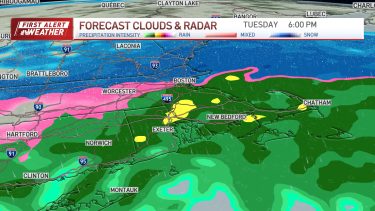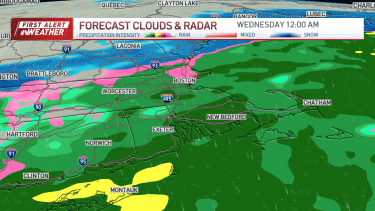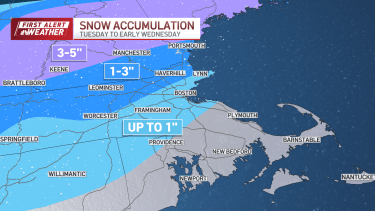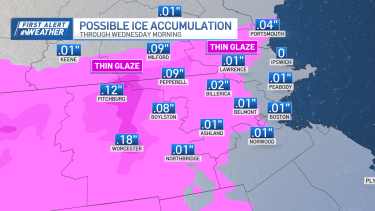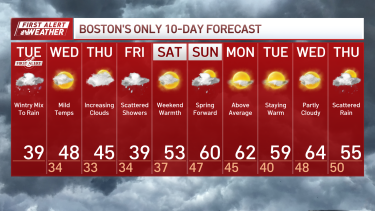Boston, MA
Buy you a drink? Boston may score 225 liquor licenses – The Boston Globe

Massachusetts is on the verge of enacting a landmark overhaul of its liquor laws, which will significantly reshape Boston’s cultural and economic landscape. The legislation, which introduces 225 additional liquor licenses in the city, goes beyond a mere regulatory update — it is a powerful advancement in equity, with substantial implications for social justice, economic opportunity, and cultural enrichment.
Spearheaded by Senator Liz Miranda of Roxbury and Representative Christopher Worrell of Dorchester, the bill would expand access to liquor licenses and stimulate growth in Boston’s dynamic hospitality sector. It would create a limited number of new, nontransferable liquor licenses for specific ZIP codes in Boston. This legislation would increase opportunities for business owners and aspiring restaurateurs to contribute to the economic and cultural vitality of neighborhoods that have historically faced disinvestment and gentrification.
Without these new licenses, often the only path to obtaining a liquor license is to purchase one from a current license holder, with a reported price tag of up to $600,000. For many entrepreneurs of color, this is an insurmountable hurdle to launching their hospitality ventures.
For Boston’s Black communities, this legislation is particularly significant. Historically, systemic barriers and high costs have prevented Black entrepreneurs from entering and thriving in the city’s hospitality sector. Alcohol sales are twice as profitable as food sales, and 80 percent of restaurant concepts are not profitable without alcohol sales. However, according to the Boston Black Hospitality Coalition, less than 2 percent of Boston liquor licenses are held by operators who identify as Black — even though 22 percent of Boston residents are Black.
The anticipated increase in Black-owned restaurants and bars promises to enrich Boston’s cultural fabric, notably in Dorchester, East Boston, Hyde Park, Mattapan, and Roxbury. This influx of new businesses is expected to create job opportunities within the community, driving economic growth and fostering a renewed sense of ownership and pride. Moreover, the potential for increased investment in Black neighborhoods could catalyze broader economic revitalization and enhance social cohesion.
The bill would also contribute to the creation of “third spaces” — vital community hubs where people can gather, connect, affirm, and sustain their cultural heritage. By enabling more diverse ownership of hospitality venues, the new licenses would support the cultivation of these vibrant social and cultural gathering points, particularly in neighborhoods, like Nubian Square, that are undergoing development but lacking destinations for community connection.
Boston’s cultural landscape is set to benefit considerably from this paradigm shift. These new licenses would help nurture vibrant community ecosystems where creativity and innovation can thrive. A more varied array of liquor licenses would lead to a dynamic hospitality scene that reflects the city’s diverse population. New establishments will bring fresh perspectives, excitement, and creative energy to Boston’s neighborhoods, enhancing the city’s reputation as a cultural hub.
The reform also addresses the pressing issue of retention and attraction of talent in the city and across Massachusetts by supporting the growth of Black-owned businesses and generating new job opportunities. Small, diverse businesses are more likely to contribute to the local economy by hiring workers in the neighborhood. This promotes both economic development and strengthens Boston’s competitive edge in an evolving job market.
We applaud the Legislature for coming to an agreement and look forward to the bill being sent to and signed by Governor Maura Healey. This overdue reform will reflect the city’s diverse and dynamic communities.
Nicole Obi is president and CEO of the Black Economic Council of Massachusetts. Imari Paris Jeffries is president and CEO of Embrace Boston.

Boston, MA
Charlotte plays Boston on 5-game win streak

Charlotte Hornets (31-31, ninth in the Eastern Conference) vs. Boston Celtics (41-20, second in the Eastern Conference)
Boston; Wednesday, 7:30 p.m. EST
BETMGM SPORTSBOOK LINE: Celtics -6.5; over/under is 214.5
BOTTOM LINE: Charlotte is looking to keep its five-game win streak alive when the Hornets take on Boston.
The Celtics are 27-13 against Eastern Conference opponents. Boston is sixth in the NBA with 46.2 rebounds led by Nikola Vucevic averaging 8.8.
The Hornets are 19-21 in conference matchups. Charlotte is 7-8 when it turns the ball over less than its opponents and averages 15.0 turnovers per game.
The Celtics average 15.5 made 3-pointers per game this season, 2.7 more made shots on average than the 12.8 per game the Hornets allow. The Hornets average 16.0 made 3-pointers per game this season, 2.1 more made shots on average than the 13.9 per game the Celtics allow.
TOP PERFORMERS: Jaylen Brown is averaging 29 points, 7.1 rebounds and five assists for the Celtics. Payton Pritchard is averaging 17 points and 5.8 assists over the past 10 games.
Kon Knueppel is averaging 19.2 points, 5.5 rebounds and 3.5 assists for the Hornets. Brandon Miller is averaging 22.7 points, 5.3 rebounds and 3.6 assists over the past 10 games.
LAST 10 GAMES: Celtics: 8-2, averaging 109.4 points, 50.7 rebounds, 27.1 assists, 6.1 steals and 6.4 blocks per game while shooting 45.7% from the field. Their opponents have averaged 98.5 points per game.
Hornets: 7-3, averaging 117.3 points, 47.8 rebounds, 27.4 assists, 8.5 steals and 4.2 blocks per game while shooting 45.6% from the field. Their opponents have averaged 106.2 points.
INJURIES: Celtics: Jayson Tatum: out (achilles), Neemias Queta: day to day (rest).
Hornets: Coby White: day to day (injury management).
___
The Associated Press created this story using technology provided by Data Skrive and data from Sportradar.
Boston, MA
First Alert: Mix of snow and rain today, then looking ahead to warmer weather

Today is a First Alert weather day. A system to our south is pushing mix of snow and rain into southern New England through this evening and tonight.
For us here in Greater Boston, expect snow to continue spreading over our area through the afternoon/evening commute. In fact, parts our area could see up to 1 to 2 inches of snow accumulation before the sleet and rain move in.
Much of Greater Boston will likely see snow amounts on the lower end. Higher snow amounts are expected toward southern New Hampshire and along and north of outer Route 2. Also, some ice accumulations are possible, up to a tenth of an inch, creating a thin glaze here and there.
Dozens of schools in Connecticut and Massachusetts have already announced early dismissals as a result of the storm.
While this system won’t cripple our area, conditions could still create a mess on the roads during the evening commute through tonight. Be careful while driving. A Winter Weather Advisory remains in effect for parts of our area through early Wednesday morning. High temperatures will be in the mid to upper 30s today. Overnight lows will drop into the low 30s.
We’ll wake up to patchy fog Wednesday morning before the sun returns. High temperatures will be in the upper 40s. We’ll stay in the 40s on Thursday with increasing clouds. But by late Thursday night into Friday, wet weather returns. Some snow could mix with the rain into Friday morning. Highs will be in the upper 30s Friday.
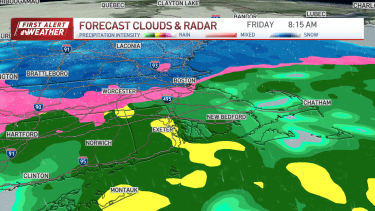
Warmer weather is expected this weekend. Highs will be in the 50s Saturday and possibly near 60 on Sunday.
Boston, MA
Boston police officials dominate the list of highest-paid city workers in 2025 – The Boston Globe

That was more than what every other city department spent on overtime combined, though it was a slight drop from the $103 million the police department spent on overtime in 2024.
High overtime spending inside the police department has long been controversial and a source of frustration for police-reform advocates. Last year’s nine-figure total comes as Mayor Michelle Wu warns of a challenging budget season to come for the city, which is grappling with inflation and the possibility of more federal funding cuts.
In a December letter, Wu told the city council that she instructed city department heads to find ways to cut 2 percent of their budgets in the next fiscal year. She also imposed a delay on new hires. Boston Public Schools Superintendent Mary Skipper has also proposed cutting somewhere between 300 and 400 positions next fiscal year due to budget constraints.
Overall, the city spent about $2.5 billion on employee salaries in 2025, up around 1.5 percent from $2.4 billion in 2024. The city employs roughly 21,000 workers, according to a public dashboard.
In a statement, Emma Pettit, a spokesperson for Wu’s office, attributed the payroll increase to raises, and in some cases, employees receiving retroactive pay, that were part of contracts the city negotiated with its various labor unions.
“We’re grateful to our city employees for their hard work to hold Boston to the highest standard for delivering city services,” Pettit said.
When Wu won her first mayoral race in November 2021, all of the city’s 44 union contracts had expired. Since then, Wu’s office has negotiated new agreements with all of them, and last year, agreed to a one-year contract extension with the Boston Police Patrolmen’s Association, the city’s largest police union.
But as the city heads back to the bargaining table to negotiate extensions or new contracts with others, city leaders should keep cost at the forefront of those conversations, said Steve Poftak, president of the Boston Municipal Research Bureau, a business-backed budget watchdog group.
“As budgets tighten, I’m hopeful that it increases the scrutiny on these collective bargaining agreements,” Poftak said.
The top earner on the city’s payroll last year was Boston Police Captain Timothy Connolly. In addition to his $194,000 base salary, Connolly took home nearly $230,000 in overtime, about $26,000 in undefined “other pay,” and roughly $49,000 as part of a higher-education bonus, for a total of $498,145 in compensation.
Skipper, as BPS superintendent, was the 55th-highest earner among city workers, coming behind 54 members of the police department. She made a total of $378,000 in 2025.
Nearly 300 city employees made more than $300,000 last year. In contrast, Wu made $207,000, though her salary increased to $250,000 this year. More than 1,700 city employees made more than the mayor in 2025.
Larry Calderone, president of the Boston Police Patrolmen’s Association, argued that the high overtime costs in the police department are, in part, a result of understaffing.
The department is short roughly 400 rank-and-file police officers, Calderone said, meaning the department has to pay its staff to work overtime and fill vacant shifts. The average salary for an officer in the BPPA is roughly $195,000, Calderone said.
With several large events approaching, including a Boston-based fan fest around this summer’s World Cup matches and the return of a fleet of tall ships to Boston Harbor, Calderone said most of the members of his union are likely to be working the maximum allowable 90 hours a week.
“We just don’t have the bodies on the street,” he said.
The Boston Police Department and the Boston Police Superior Officers Federation — the union that represents the department’s sergeants, captains, and lieutenants — did not immediately return requests for comment Monday.
Jamarhl Crawford, an activist and former member of the Boston Police Reform Task Force, said while high spending on overtime is not new for the police department, it’s a pressing problem the city should tackle.
The police and fire departments are “essential components of the city and society in general … [and] folks should be getting a fair wage. But it also has to be within fiscal responsibility,” Crawford said.
“In another 10 years,” he continued, “with pensions and everything else, this type of thing can bankrupt the city.”
Niki Griswold can be reached at niki.griswold@globe.com. Follow her @nikigriswold. Yoohyun Jung can be reached at y.jung@globe.com.
-

 World6 days ago
World6 days agoExclusive: DeepSeek withholds latest AI model from US chipmakers including Nvidia, sources say
-

 Massachusetts7 days ago
Massachusetts7 days agoMother and daughter injured in Taunton house explosion
-

 Denver, CO7 days ago
Denver, CO7 days ago10 acres charred, 5 injured in Thornton grass fire, evacuation orders lifted
-

 Louisiana1 week ago
Louisiana1 week agoWildfire near Gum Swamp Road in Livingston Parish now under control; more than 200 acres burned
-

 Oregon5 days ago
Oregon5 days ago2026 OSAA Oregon Wrestling State Championship Results And Brackets – FloWrestling
-

 Florida3 days ago
Florida3 days agoFlorida man rescued after being stuck in shoulder-deep mud for days
-

 Maryland3 days ago
Maryland3 days agoAM showers Sunday in Maryland
-

 Culture1 week ago
Culture1 week agoTry This Quiz on Thrilling Books That Became Popular Movies












